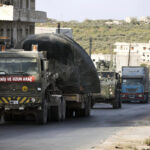
Canada has sanctioned three powerful Haitian politicians including a current senator, freezing any assets they may have in that country as part of its ongoing effort along with the United States and the U.N. Security Council, to stem the escalating gang violence and the flow of illegal arms.
The politicians are former Sen. Herve Fourcand, current Sen. Rony Célestin and former president of the Lower Chamber of Deputies Gary Bodeau. They join two other politicians — Joseph Lambert, the current president of the Senate and Youri Latoture, the former head of the Senate — who were both sanctioned by Canada and the United States in a joint effort.
The sanctions were announced Saturday by Minister of Foreign Affairs Mélanie Joly.
“Canada continues to pressure armed gangs and their supporters to help the people of Haiti emerge from this crisis and restore peace and security to their country,” Joly said. “We will consider the imposition of new sanctions against individuals and entities in Haiti as well as other measures to end the ongoing violence.”
READ MORE: Rising homicides, kidnappings in Haiti show crisis is not over even as fuel flow resumes
In a statement, the Canadian government said it has reason to believe that the the sanctioned politicians “are using their status as a former or current holder of a public office to protect and allow the illegal activities of armed criminal gangs, including money laundering and other acts of corruption.
Canada says the sanctions are being imposed under the Special Economic Measures Regulations against Haiti in response to the unacceptable conduct of members of the Haitian political elite who provide illicit financial and operational support to armed gangs.
In a statement to the Miami Herald, Bodeau called the sanctions “a political move” to assassinate his character and prevent him from participating in any future election. He said he was “really shocked” to see his name among those cited in a tweet by Canada’s ambassador to Haiti announcing the targets of the latest sanctions.
“All my life I have never participated in gang related things, human rights violation, or drug activities in my country or anywhere else. I have never participated in anything that can destabilize my country and the safety of my fellow Haitians,” Bodeau said.
Canadian officials did not provide specifics as to why the three politicians are being sanctioned and it’s unclear if the Biden administration will follow through.
Célestin, who represents Haiti Central Plateau in what’s left of the country’s dysfunctional 10-member Senate, has been at the center of controversy for awhile and in the eye of the Canadian government.
Last year, Canada’s La Presse reported that his wife had purchased a luxury $4.25 million villa in Laval. The purchase had attracted so much criticism from Haitians in Montreal the woman, employed as a diplomat at the Haiti consulate in Montreal, was living under the protection of private security guards.
Fourcand meanwhile is from the southern region of Haiti that was struck by a deadly earthquake in August of last year, and has been a hotbed of violent protests this year.
After the quake left more than 2,000 dead, Fourcand personally flew dozens of injured Haitians to hospitals in Port-au-Prince. His name, however, had previously been mentioned in a U.S. arms trafficking case in Fort Lauderdale but no charges were brought against him.
READ MORE: Arms trafficking case in U.S. court spotlights Haiti’s illegal weapons problem
Bodeau said since last year’s assassination of former President Jovenel Moise, whom he considered an ally, he has been “targeted and persecuted by different political leaders including the current government.”
He claimed that he was attacked by violent mobs with rocks and guns at his current residence on Sept. 13 and 14 of this year.
“When I called the authorities of my country nobody came to my rescue,” he said, appealing to Haitians to stand with him.
Haiti’s gangs and their supporters continue to terrorize vulnerable populations in the country, Canada asserts, with impunity, and have caused a humanitarian crisis in the country, which includes the resurgence of cholera.
“Gangs also commit unspeakable acts of violence, including widespread sexual violence, against affected populations and prevent the delivery of essential services and the delivery of humanitarian aid,” the statement said.




